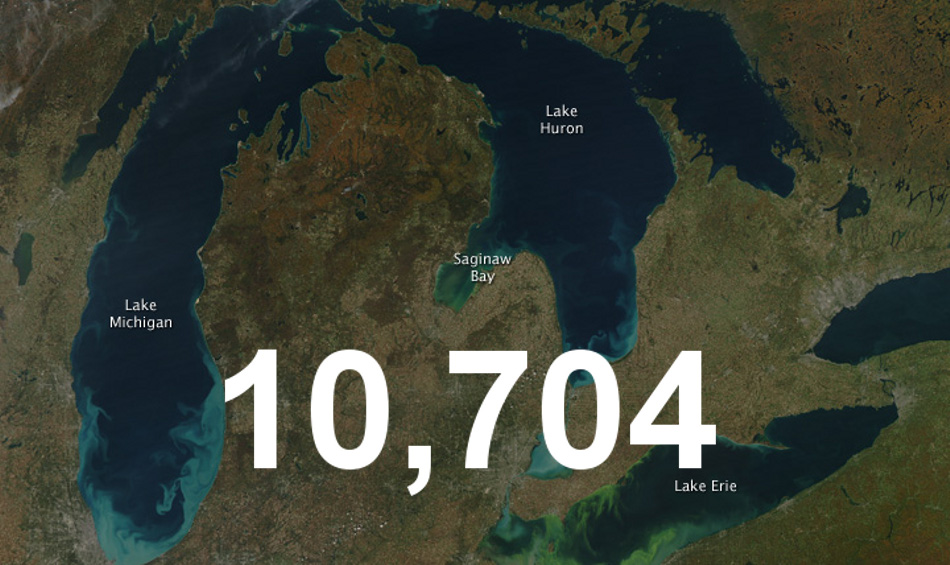

 |
| 11/24/16 | |||||
Michigan vote certified, no recount has ever overturned a lead this size
If elections fall within 2000 votes in Michigan, an automatic recount is triggeredSome modifications made to photo |
|||||
Trump leads in Michigan by more than Hillary led in New Hampshire Trump has defeated Hillary Clinton for the presidency in the state of Michigan by a margin of 10,704 votes according to the Michigan Secretary of State. Despite the certification, no national television network has yet projected Trump the winner of Michigan's sixteen electoral votes. This is extremely unusual even in races decided by 0.23% of the vote. In fact, the state of New Hampshire was called for Clinton on November 11th by CNN when Clinton held a 0.2% lead, ahead by only 1,437 votes. Instead of projecting Trump the winner of Michigan two weeks after the election when the vote has been certified, the networks refuse to project Trump the winner, instead preferring to trumpet calls for a recount in the state based on phantom vote hacking, something that is virtually impossible in Michigan because it uses all paper ballots.
But it is true that the exit polls showed Hillary tied in Michigan, so should that make us think a recount is warranted? Not at all because the exit polls gave Hillary better numbers than she actually received in almost every state. Only in California, New York, Minnesota, Illinois and Texas did Clinton do better than the exit polls predicted. These exit polls failed miserably. They routinely understated Trump's level of support by large margins. The exit polls missed Trump's number by 11 in New Jersey, 10.7 in Missouri, 9.6 in Utah, 8.4 in Ohio, 8.2 in Maine, 8.2 in South Carolina, 5.9 in North Carolina and the list goes on. Of the twenty-eight state exit polls reported here, Trump's vote was understated by an average of 3.6%. What one might find quite interesting, however, one state where the exit polls almost nailed the final result, which only happened in about six states, was Michigan. The exit polls predicted a tie and Trump won by 0.23%. So the exit polls do not provide a good argument for a recount. There is also the concern about vote hacking. Fortunately for democracy, the likelihood of vote hacking making a difference in Michigan is virtually zero. All ballots in Michigan are paper ballots, so vote hacking of electronic machines seems unlikely. While some imagine fanciful scenarios whereby the machines that count the paper ballots are hacked, the Michigan elections director doubts that vote-hacking is a legitimate concern. |
Comparing Trump's Michigan lead to other margins that actually justified a recount How does a lead of 0.23% and 10,704 votes stack up in comparison with past recounts. In a word, the lead looks insurmountable. Let's look at five recounts, some of which overturned the result and some that didn't. There have been five notable recounts in the last twenty years. In the 2004 Washington state gubernatorial race the Republican was ahead by 261 votes initially, but after two recounts ended up losing by 129 votes. There were about 2.8 million votes cast total and the initial margin separating the two was 0.009% of the vote. In the 2006 Vermont Auditor's race, the initial count showed the Republican up by 137 votes. After the recount the Democrat took a 102 vote lead. There were 250,609 total votes case and the initial vote margin was 0.05% of the vote. In 2006 in Florida's 13th congressional district, the Republican led by 350 votes initially and held the lead after a recount. There 238,249 votes cast and the initial vote margin was 0.14% of the vote. In the 2008 Minnesota US Senate election, Al Franken trailed Norm Coleman by 215 votes. After the recount Franken took a 225 vote lead. There were 2.9 million votes cast and the initial vote margin was 0.008% of the vote. Last, who can forget the presidential election of 2000 in Florida. The state would determine who won the presidency. After all votes were counted, including some military votes a few days after the election, Bush led by 930 votes. His lead would dwindle to 537 votes. The total votes cast was 6 million and the initial margin was 0.016% of the total vote. In Michigan in 2016, the initial vote margin is 10,704 votes cast. There were a total of 4.8 million votes, so the initial margin is 0.23%.
So when comparing the lead Trump holds in Michigan to other statewide elections where recounts were called for, Trump looks safe. In every case of a recount on a statewide level the vote margins are in the hundreds, not the thousands. A vote lead of 10,704 votes is a very large lead to overcome in a recount. In fact, it looks like an impossible mission.
|
||||
